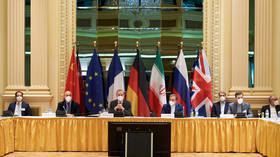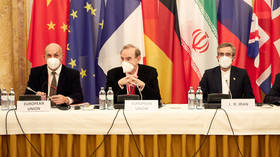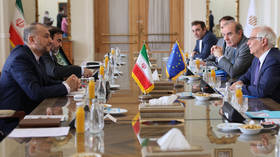EU plan to revive Iranian nuclear deal leaked

A proposal the EU has submitted at the Vienna talks to revive the Iranian nuclear deal would reportedly see an immediate lifting of sanctions on over 160 Iranian entities, including banks, in exchange for Tehran gradually scaling down its nuclear activities, Al Jazeera reported on Friday, citing “informed sources.”
The proposal that Brussels previously called “final” reportedly involves four stages and would take at least 120 days to be fully implemented, the media outlet said. The “first day” after its signing would see the lifting of sanctions on 17 Iranian banks and 150 other economic entities. Tehran, in turn, would also begin returning to its commitments under the agreement from day one and scale back its nuclear activities.
The implementation of this accord would also involve the release of $7 billion in Iranian funds that are currently frozen in South Korea, the report said.
During the 120-day period after the signing of the agreement, Iran will be allowed to export 50 million barrels of oil as part of a “verification mechanism,” Al Jazeera said, citing its sources. After that period, the Islamic Republic would be able to export 2.5 million barrels per day.
The proposal also includes an obligation for the US to pay a fine if it ever pulls out of the deal again, Al Jazeera said, without revealing the amount of any such penalty or where the money would go.
Iran submitted a written response to the proposal on Monday, without revealing its details. “There are three issues that if resolved, we can reach an agreement in the coming days,” Iranian Foreign Minister Hossein Amirabdollahian said at the time. “We have shown enough flexibility... We do not want to reach a deal that after 40 days, two months or three months, fails to be materialized on the ground,” he added, warning that Tehran’s “red lines” should be respected.
Earlier, the US said the 2015 nuclear deal could be revived only if Iran drops its “extraneous” demands, which included an end to the International Atomic Energy Agency’s (IAEA) probe into unexplained uranium traces in Iran and the removal of the Iranian Revolutionary Guard Corps (IRGC) from the American terrorism list.
Al Jazeera reported on Friday, citing a European official in Vienna, that Tehran is no longer seeking the removal of the organization from the list.
Last week, Politico reported that the EU had proposed watering down the US sanctions on the IRGC as part of efforts to revive the 2015 deal. The news outlet also said Washington was set “to make greater concessions than expected” to revive the deal.
According to Politico, the text of the proposal also said Washington and Brussels “take note of Iran’s intent” to address the issue of the IAEA probe by the time the agreement enters into force again.
The Iranian nuclear deal, formally known as the Joint Comprehensive Plan of Action (JCPOA), was signed in 2015 by Iran, the US, UK, France, and Germany, as well as Russia, China, and the EU. It involved Iran agreeing to certain restrictions on its nuclear program in exchange for economic sanctions relief. In 2018, the US unilaterally withdrew from the deal under President Donald Trump. Talks to revive the deal have been taking place in Vienna for the past 16 months.















